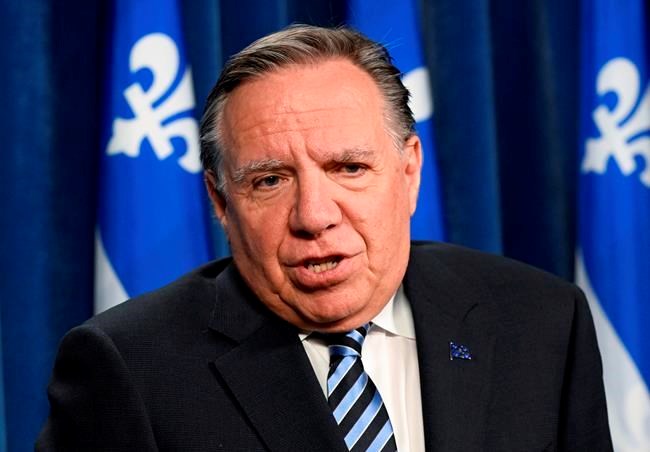QUEBEC — Months after saying that accepting more than 50,000 immigrants a year would be “suicidal” for Quebec, the province’s premier is considering increasing the number of immigrants who arrive in the province to 60,000 a year.
Premier François Legault said that will be possible after an immigration reformannounced Thursday, which will require the vast majority of people who come through the province's economic immigration system to speak French before they arrive.
"From the moment we are able to, because there's real openness on the part of the federal government, say that the increase is only francophones, or people who have mastered French, that completely changes the situation," he told reporters Thursday in Quebec City.
Legault said the potential rise in immigration would come entirely from an increase in the number of people accepted through the Quebec-controlled economic immigration stream.
Sixty-five per cent of immigrants to Quebec come through the economic stream, which is controlled by the province, with the rest coming through the federally-controlled family reunification and refugee programs.
Legault said that when he described increased immigration as suicidal last year, he believed that the federal government would require increases in those two categories if Quebec accepted more economic immigrants.
“I thought, at the time, that the federal government wouldn't permit us to increase only the percentage of economic immigrants and, so far, with the discussion we’ve had with the federal government, they are more than open to accept that, so it's changing the picture completely," he said.
He said the increase is one of two scenarios the province is considering and that the other scenario would maintain immigration at 50,000 people a year.
If the increased threshold is adopted, Legault said immigration levels would rise gradually to reach 60,000 people a year by 2027.
The actual number of immigrants the province accepts could be even higher, he said, because that figure doesn't include people who come through a fast-track program for graduates of Quebec universities.
However, that program -- which currently requires applicants to have a higher level of French than many workers who would be accepted under the province's new plan and is open to graduates of all Quebec post-secondary institutions -- will be restricted to students who graduate from programs taught in French, or who attended high school in French.
Legault said that as premier of Quebec his primary responsibility is to protect the province's French character.
"Since the last 10, 15, 20 years, we see that the percentage of people speaking French is decreasing, so we have to do something and I think it's important that we request that they speak French before being accepted," he said.
Christine Fréchette, Quebec's immigration minister, said the reform -- which will go ahead whether the province decides to increase its immigration threshold or not -- will change the way Quebec selects immigrants, moving away from a point system that rewards, but does not require, knowledge of the French language.
The point system will be replaced by a system where certain criteria, such as French-language knowledge, must be met.
While graduates of English-language programs at Quebec universities will no longer be eligible for the fast track, known as the Quebec Experience Program, Fréchette said graduates of those programs who do speak French can still apply as skilled workers.
"So it's not like the door is closed, it's that there's another path that will have to be taken," she said.
She said that under the new plan, 96 per cent of people who apply to immigrate to Quebec through the economic stream will be required to speak French.
That would increase the number of all immigrants to Quebec who speak French from 68 per cent in 2022, to 72 per cent by 2027, if the increase is adopted, or 70 per cent by 2027, if the number of immigrants remains at 50,000 people a year.
Legault said he's not yet committed to the increase, adding that he wants to consult with experts first.
Business groups generally welcomed the reform and the possibility that the province will raise immigration levels.
The Conseil du patronat du Québec, a large employers group, said the reform appears to find a balance between promoting the French language and helping employers find skilled workers.
Opposition parties, however, criticized the reform for failing to address the issue of temporary foreign workers.
There are around 346,000 temporary residents in the province, including international students, temporary workers and asylum seekers.
Monsef Derraji, immigration critic for the Opposition Liberals, said the government should make French-language programs available to temporary workers.
Québec solidaire immigration critic Guillaume Cliche-Rivard said the government needs a plan to encourage immigrants to settle outside of major cities, and should do that by giving temporary workers a path to permanent residence.
This report by The Canadian Press was first published May 25, 2023.
- By Jacob Serebrin in Montreal.
The Canadian Press

